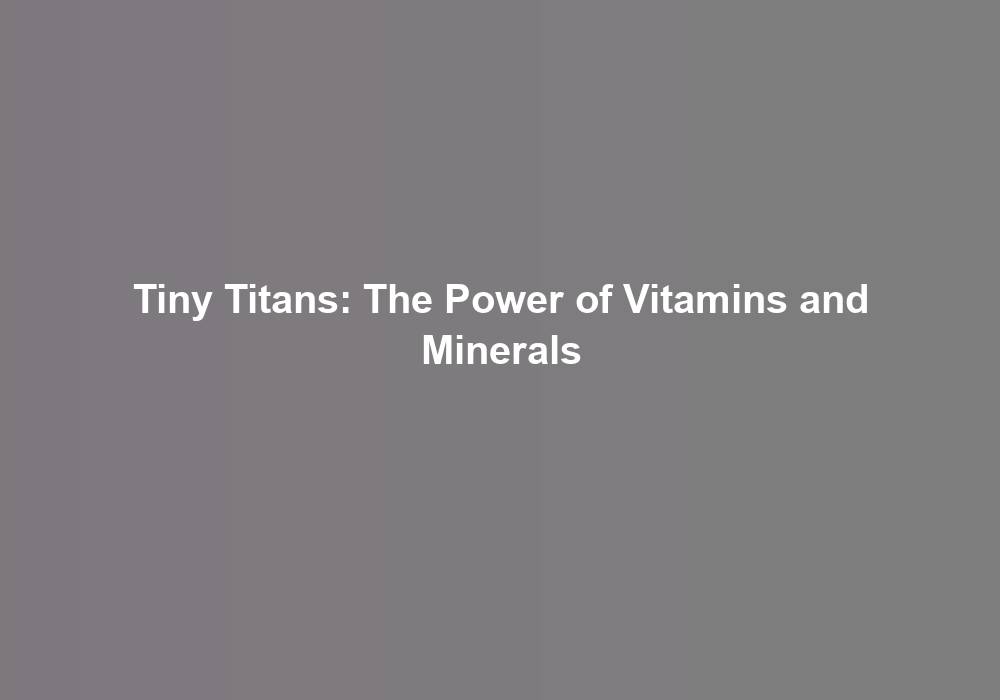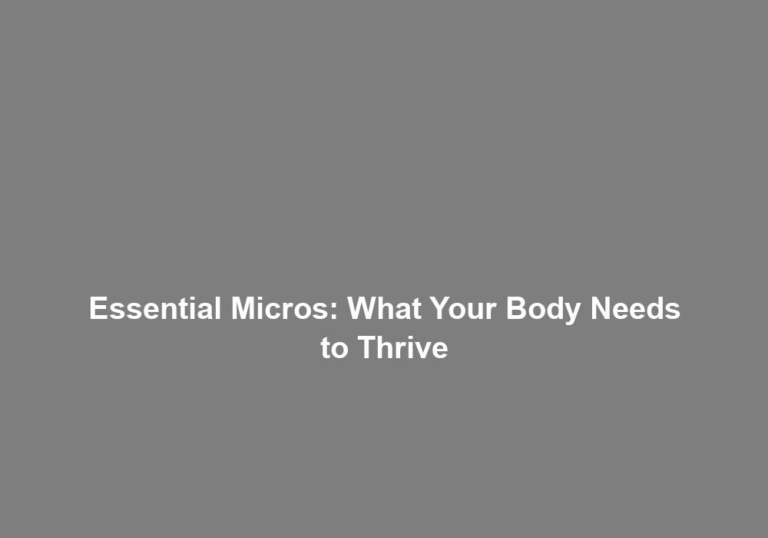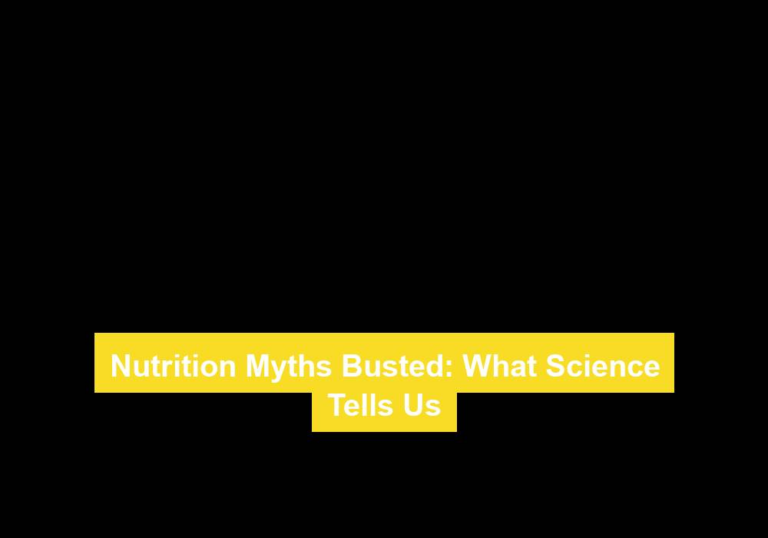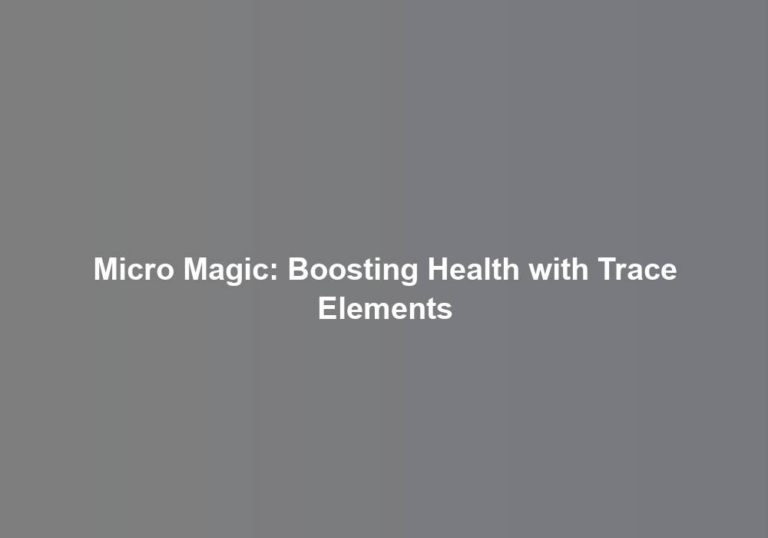Tiny Titans: The Power of Vitamins and Minerals
Unlock the potential of tiny titans G?? vitamins and minerals G?? that play a pivotal role in your overall well-being. From supporting immune health to boosting vitality and energy, these essential nutrients are the unsung heroes of your bodyG??s daily functions. But thereG??s more to their power than meets the eye. Understanding how these tiny titans work their magic can be the key to unlocking a healthier, happier you.
The Role of Vitamins and Minerals in Immune Health
To support a healthy immune system, your body requires a variety of vitamins and minerals. Among these, the role of gut health is paramount in maintaining a robust immune function. Your gut is home to trillions of bacteria, known as the gut microbiota, which play a crucial role in supporting immune function. When the balance of these microorganisms is disrupted, it can negatively impact your immune system. Therefore, itG??s essential to consume foods rich in fiber, such as fruits, vegetables, and whole grains, to promote a healthy gut environment.
In addition to gut health, the antioxidant benefits of certain vitamins and minerals are vital in protecting your immune system. Antioxidants, such as vitamin C, vitamin E, and selenium, help neutralize harmful molecules called free radicals, which can weaken the immune response. Including a variety of antioxidant-rich foods in your diet, such as berries, nuts, and leafy greens, can provide your body with the necessary tools to combat oxidative stress and support a strong immune system.
Vitality and Energy: How Vitamins and Minerals Make a Difference
Boost your vitality and energy levels with the essential vitamins and minerals your body needs for peak performance. By incorporating the right nutrients into your diet, you can enhance your metabolism and boost your overall energy levels for a more vibrant life. Here are four key ways vitamins and minerals can make a difference in your vitality and energy:
-
Boosting Performance: Certain vitamins and minerals play a crucial role in supporting your bodyG??s energy production and overall performance. For instance, vitamin B12 is essential for the formation of red blood cells, which transport oxygen throughout your body, while iron is vital for oxygen transportation and energy production.
-
Enhancing Metabolism: Minerals such as magnesium and zinc are essential for supporting your metabolism. Magnesium is involved in over 300 enzymatic reactions in the body, including energy production, while zinc is a co-factor for numerous enzymes involved in metabolism and energy production.
-
Supporting Cellular Energy Production: Vitamins like riboflavin (B2), thiamine (B1), and niacin (B3) are crucial for the conversion of food into energy at the cellular level. These vitamins help your body metabolize carbohydrates, fats, and proteins, providing the energy needed for daily activities.
-
Regulating Energy Storage and Release: Minerals such as chromium and manganese play a role in regulating blood sugar levels and the metabolism of carbohydrates, which can impact your energy levels and overall vitality.
Mood and Mental Well-being: The Impact of Essential Nutrients
Enhance your mood and mental well-being by understanding the impact of essential nutrients on your mental health and cognitive function. Nutrient balance plays a crucial role in regulating mood and emotional well-being. Vitamins such as B-complex vitamins, particularly B6, B12, and folate, are essential for the production of neurotransmitters like serotonin and dopamine, which are linked to mood regulation. A deficiency in these vitamins can lead to symptoms of depression and anxiety. Additionally, minerals like magnesium and zinc are vital for maintaining a stable mood. Magnesium, for instance, helps regulate the stress response and supports relaxation, while zinc is involved in neurotransmitter function and has been linked to alleviating symptoms of depression.
In terms of mental clarity, the link between minerals and cognitive function is undeniable. Minerals like iron, zinc, and iodine are essential for cognitive development and maintaining optimal brain function. Iron is necessary for oxygen transport to the brain, and a deficiency can lead to cognitive impairment and poor concentration. Zinc plays a role in memory formation and cognitive stability, while iodine is crucial for proper brain development, especially in early life.
Understanding the impact of essential nutrients on mood and mental well-being empowers you to make informed choices about your diet and overall health. By ensuring a balanced intake of vitamins and minerals, you can support your mental health and cognitive function, ultimately leading to a more fulfilling and vibrant life.
Supporting Bone Health With Vitamins and Minerals
Improving bone health requires a balanced intake of essential vitamins and minerals, such as calcium, vitamin D, and magnesium, which play crucial roles in maintaining bone density and strength.
When it comes to supporting bone health with vitamins and minerals, here are four key points to keep in mind:
-
Calcium and Vitamin D: Bone Health The dynamic duo of calcium and vitamin D is essential for bone health. Calcium is the building block of bones, providing structural support, while vitamin D aids in the absorption of calcium, ensuring that it is effectively utilized by the body. Together, they work to enhance bone mineral density and reduce the risk of fractures.
-
Magnesium and Vitamin K: Bone Support Magnesium is another vital nutrient for bone health, as it helps regulate calcium levels in the body and contributes to bone structure. Vitamin K, particularly K2, plays a key role in bone metabolism by assisting in the binding of calcium to the bone matrix, thereby supporting bone mineralization and strength.
Ensuring an adequate intake of these essential vitamins and minerals is crucial for maintaining strong and healthy bones. By incorporating these nutrients into your diet, you can support your bone health and reduce the risk of osteoporosis and other bone-related conditions. Remember, a balanced and varied diet, along with regular physical activity, is essential for overall bone health.
Ensuring Adequate Intake: Tips for Getting Essential Nutrients
To ensure your intake of essential vitamins and minerals necessary for bone health, consider incorporating diverse nutrient-rich foods into your diet. Dietary balance is crucial for obtaining all the necessary nutrients. Include a variety of fruits, vegetables, whole grains, lean proteins, and healthy fats in your meals. By doing so, you can ensure that you are getting a wide range of vitamins and minerals that contribute to overall bone health.
Furthermore, paying attention to nutrient absorption is key. Some nutrients rely on the presence of others for proper absorption. For example, vitamin D aids in the absorption of calcium, a vital mineral for bone strength. Including sources of vitamin D, such as fatty fish or fortified dairy products, can enhance your bodyG??s ability to absorb calcium effectively.
In addition to dietary balance, itG??s important to be mindful of certain factors that can hinder nutrient absorption. For instance, excessive consumption of caffeine and alcohol can interfere with the absorption of certain vitamins and minerals. Being moderate in your consumption of these substances can help support optimal nutrient absorption.
Conclusion
So, there you have it – the power of vitamins and minerals! With the right balance of essential nutrients, you can feel like a superhero, ready to take on the world. Keep fueling your body with these tiny titans to support your immune health, boost your vitality, maintain a positive mood, and keep your bones strong. ItG??s time to unleash the power of vitamins and minerals and live your best, healthiest life!







